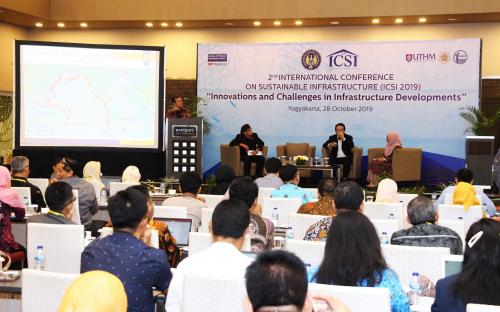- Alamat : Kampus Karangmalang, Yogyakarta, 55281
- Telp. (0274) 586168 psw. 1216,1276,1289,1292 (0274) 586734 Fax. (0274) 586734
- Help Desk (WhatsApp) : 0895-2919-9119 (Jam Kerja 07.30 - 16.00 WIB)
- website : http://ft.uny.ac.id
- e-mail: ft@uny.ac.id
You are here
ICSI 2019: Innovation and Challenges for Infrastructure Development
The infrastructure sector which is one of the government's programs not only aims to grow the economy, but is also able to develop human civilization in all regions. Infrastructure refers to a set of structural elements that support the function of daily life, also give a big influence to the progress of society. Infrastructure is an important component of national competitiveness in increasing economic progress and reducing poverty. The challenge in the infrastructure sector today refers to sustainable programs related to the design, development and operation of structural elements without reducing the social, economic and ecological processes needed to maintain human equality, diversity and functionality of natural systems. Moreover, infrastructure expansion often sacrifices the local environment, and influences climate change.
Answering this challenge, the Department of Civil Engineering and Planning Education, Faculty of Engineering, Yogyakarta State University held The 2nd International Conference on Sustainable Infrastructure (ICSI 2019) at Eastparc Hotel (2019/10/28) with the theme "Innovation and Challenges for Infrastructure Development". Dr. Ing Satoto Endar Nayono as Chair of the 2019 ICSI Committee said that this agenda focused on environmental sustainability within the scope of infrastructure development by presenting various results of demonstration research and relevant applications to contribute to the nation's competitiveness and public welfare related to infrastructure development.
Three main speakers were present at this conference, Prof. Prof. Madya Dr. Zainal Abidin Akasah from the Department of Architecture, Faculty of Civil Engineering & Built-Environment, Universiti Tun Hussein Onn Malaysia (UTHM), Prof. Teuku Faisal Fathani, Ph.D. from the Gadjah Mada University Postgraduate and Prof. YAN Denghua from the Institute of Water Resources and Hydropower Research (IWHR), China.
Prof. Madya Dr. Zainal Abidin Akasah presented the visualization of a 3-d wind load system in a sustainable bamboo green design as a post-disaster shelter. Meanwhile Prof. YAN Denghua presented about soil and water conservation technology.
In this seminar, Prof. Teuku Faisal Fathani demonstrated the innovation of multi-disaster early detection devices starting from the first generation to the fifth generation that has been born called the Gadjah Mada Early Warning System or GAMA-EWS. About 35 variants of disaster early detection equipment such as exstensometer, crackmeter, tiltmeter, inclinometer, competitor, ultrasonic water level sensor, LIDAR water level sensor, groundwater sensor, and automatic weather observation system (AWOS) have been protected with 5 patents. (Steven)
Bagian dan Sub Bagian
Link Journal
Kontak Kami
Copyright © 2024,

